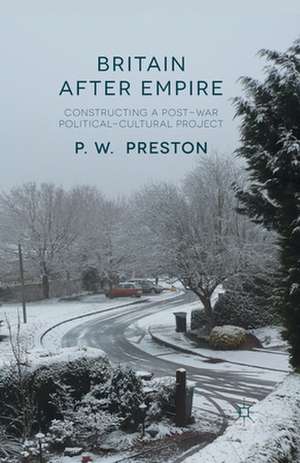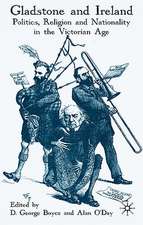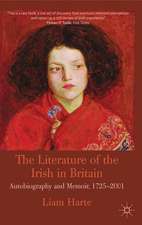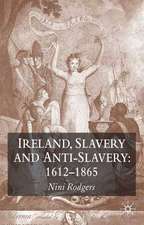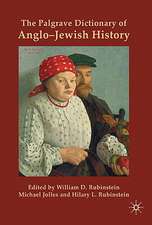Britain After Empire: Constructing a Post-War Political-Cultural Project
Autor P. Prestonen Limba Engleză Paperback – 2014
| Toate formatele și edițiile | Preț | Express |
|---|---|---|
| Paperback (1) | 384.70 lei 6-8 săpt. | |
| Palgrave Macmillan UK – 2014 | 384.70 lei 6-8 săpt. | |
| Hardback (1) | 391.61 lei 6-8 săpt. | |
| Palgrave Macmillan UK – 22 ian 2014 | 391.61 lei 6-8 săpt. |
Preț: 384.70 lei
Nou
Puncte Express: 577
Preț estimativ în valută:
73.64€ • 80.01$ • 61.89£
73.64€ • 80.01$ • 61.89£
Carte tipărită la comandă
Livrare economică 21 aprilie-05 mai
Preluare comenzi: 021 569.72.76
Specificații
ISBN-13: 9781349438341
ISBN-10: 1349438340
Pagini: 278
Ilustrații: VIII, 278 p.
Dimensiuni: 140 x 216 mm
Greutate: 0.34 kg
Ediția:1st ed. 2014
Editura: Palgrave Macmillan UK
Colecția Palgrave Macmillan
Locul publicării:London, United Kingdom
ISBN-10: 1349438340
Pagini: 278
Ilustrații: VIII, 278 p.
Dimensiuni: 140 x 216 mm
Greutate: 0.34 kg
Ediția:1st ed. 2014
Editura: Palgrave Macmillan UK
Colecția Palgrave Macmillan
Locul publicării:London, United Kingdom
Cuprins
Preface Acknowledgement 1. After the Empire 2. Foundation Myths 3. Grand Designs 4. Making Enemies 5. Voices of Complaint 6. Patrician Retreat 7. Affluence Attained 8. Corporate World 9. Bullshit Industries 10. Familiar Utopias 11. Continuing Britain Bibliography Index
Recenzii
'This is a book that should be read by anyone interested in contemporary Britain. It traces developments in post-war Britain in the context of the end of Empire, but does so in a different way which focuses upon the role of ideas/narratives reflected in government designs, high arts and popular culture. It is challenging, but always interesting; even where the reader might disagree.'
- David Marsh, Director of Research, ANZSOG Institute for Governance, University of Canberra, Australia
- David Marsh, Director of Research, ANZSOG Institute for Governance, University of Canberra, Australia
Notă biografică
P. W. Preston has taught comparative politics in a number of universities in Europe and East Asia and has published widely on topics related to these two regions. His most recent concerns have been with the ways in which collective memories of violence find expression in contemporary politics both in Europe and East Asia.
